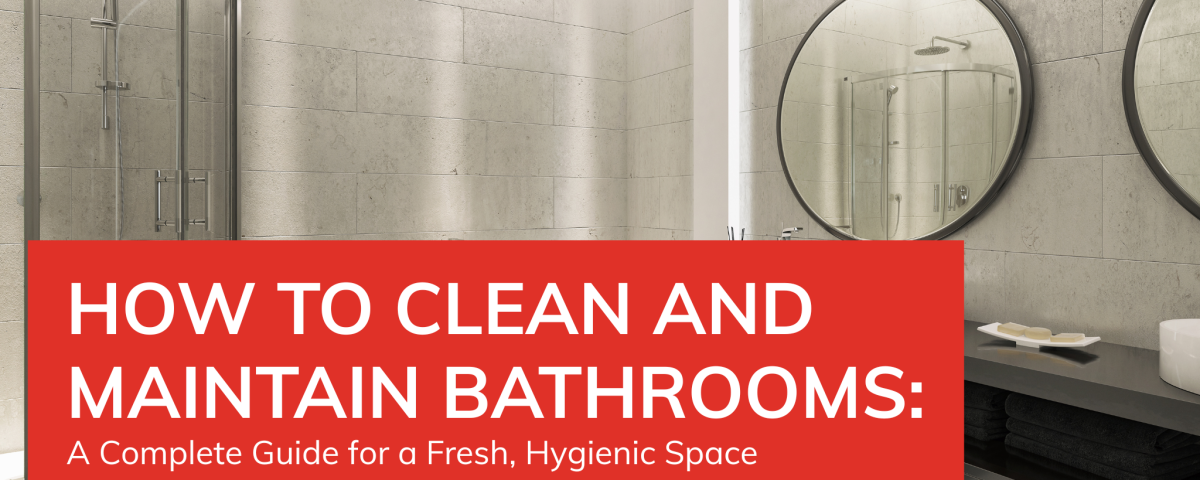
How to Effectively Remove Stubborn Stains: A Guide for Nigerian Homes
March 12, 2025
The Role of Cleaning Services in Real Estate: Enhancing Property Appeal and Value
March 12, 2025Bathrooms in Nigerian homes are often subjected to high humidity levels, heat, and heavy usage, making them prone to the development of mold, mildew, and unpleasant odors. Proper bathroom cleaning and maintenance not only keep your space looking fresh and inviting, but they also ensure a hygienic environment for you and your family. In this comprehensive guide, we’ll cover essential tips for cleaning your bathroom effectively and maintaining a fresh, odor-free space while preventing mold and mildew buildup.
1. Understanding the Importance of Regular Bathroom Cleaning
A clean bathroom is essential for maintaining both hygiene and comfort. Regular cleaning helps to prevent bacteria growth, mold, mildew, and unpleasant odors, all of which can make your bathroom an uncomfortable and unappealing place. For Nigerian homes, where humidity and tropical climates often make bathrooms more susceptible to these issues, it’s especially important to establish a consistent cleaning routine.
2. Cleaning Your Bathroom: A Step-by-Step Guide
To clean your Nigerian bathroom effectively, follow this simple step-by-step guide:
Step 1: Gather Your Cleaning Supplies
Before you begin, ensure you have all the necessary cleaning tools and supplies. These may include:
- All-purpose cleaner
- Toilet cleaner (preferably disinfecting)
- Scrub brush
- Microfiber cloths or sponges
- Baking soda
- Vinegar
- Bleach (for deep cleaning)
- Rubber gloves
Step 2: Declutter the Bathroom
Remove all personal items, toiletries, rugs, and towels from the bathroom. This gives you the freedom to clean every corner without obstruction.
Step 3: Clean the Toilet
Start by applying toilet cleaner inside the toilet bowl and scrub using a toilet brush. For the exterior of the toilet, use an all-purpose cleaner to wipe down the seat, lid, and base. Pay attention to high-touch areas such as the flush handle, which can harbor germs. Use disinfecting wipes or a cloth with a disinfecting solution for this.
Step 4: Tackle the Sink and Countertops
Apply an all-purpose cleaner to your sink, faucet, and countertop. Scrub off any soap scum or toothpaste residue. Don’t forget to clean the faucet handles, which can accumulate grime. For stubborn stains, sprinkle baking soda and scrub with a damp sponge.
Step 5: Scrub the Shower or Bathtub
In Nigerian bathrooms, showers and bathtubs often accumulate soap scum and grime due to the humid climate. Apply a bathroom cleaner to the walls and floor of your shower or bathtub, let it sit for a few minutes, and then scrub with a brush or sponge. You can also use a mixture of vinegar and water to break down soap scum and hard water stains.
Step 6: Clean the Floors
Sweep the bathroom floor thoroughly to remove dust and dirt. Then mop the floor using a disinfectant cleaner. Ensure to get into the corners and around the toilet base.
Step 7: Finish with Mirrors and Glass
Use a glass cleaner to clean mirrors and any glass surfaces, such as shower doors or windows. Buff them with a microfiber cloth to prevent streaks.
3. Preventing Mold and Mildew in Nigerian Bathrooms
Mold and mildew thrive in the humid conditions often found in Nigerian bathrooms. To prevent their growth, follow these steps:
Tip 1: Ensure Proper Ventilation
Poor ventilation is one of the main contributors to mold and mildew growth. Always use an exhaust fan if available, or open windows to allow fresh air to circulate. Installing a bathroom fan can significantly reduce moisture levels and help prevent mold buildup.
Tip 2: Use a Dehumidifier
If your bathroom tends to be very humid, consider using a dehumidifier to control the moisture levels. This will help prevent mold and mildew from forming on walls, ceilings, and other surfaces.
Tip 3: Regularly Wipe Down Surfaces
After every shower, make it a habit to wipe down wet surfaces with a microfiber cloth. This helps to remove excess moisture and reduces the likelihood of mold and mildew growing on walls, tiles, and around the tub or sink.
Tip 4: Apply Mold-Resistant Products
To prevent mold, consider using mold-resistant paint or bathroom sealants when renovating or repainting your bathroom. These products create a barrier that resists moisture, keeping mold at bay.
4. Combatting Unpleasant Odors in Nigerian Bathrooms
Odors can develop in bathrooms for various reasons, from clogged drains to dirty surfaces. Here are some tips to maintain a fresh-smelling bathroom:
Tip 1: Keep Drains Clean and Unclogged
Clogged drains are one of the most common causes of bad smells. Ensure your drains are clean by pouring a mixture of baking soda and vinegar down the drain weekly. Allow it to sit for 15-20 minutes, then flush with hot water. This helps eliminate bacteria and grime that may cause odors.
Tip 2: Use Natural Air Fresheners
Instead of relying on chemical air fresheners, opt for natural air purifiers such as essential oils. You can use a diffuser or place a bowl of baking soda mixed with a few drops of essential oils like lavender, eucalyptus, or lemon in a corner of the bathroom. These natural options are effective and safer for your health.
Tip 3: Regularly Change Towels and Mats
Damp towels and bath mats can develop unpleasant odors if left for too long. Wash towels regularly, and ensure bath mats are dried completely after each use. Consider investing in a quick-drying bath mat to reduce moisture buildup.
Tip 4: Keep Your Toilet Smelling Fresh
To prevent odors from the toilet, always keep the lid closed after flushing. Additionally, use a toilet bowl cleaner with disinfecting properties to keep bacteria and odors at bay. You can also hang air fresheners or use toilet deodorizers to maintain a fresh scent.
5. Long-Term Bathroom Maintenance Tips
To ensure your bathroom remains clean and fresh for a long time, here are some long-term maintenance tips:
- Re-seal grout lines: Over time, grout can degrade and become a breeding ground for mold. Re-sealing the grout lines every 6–12 months can help prevent moisture from seeping into tiles and causing damage.
- Replace worn-out seals: Pay attention to the seals around the shower, bathtub, and sink. If they become cracked or worn, replace them immediately to prevent water leaks and mold buildup.
- Check for leaks regularly: Inspect your bathroom fixtures, such as faucets, pipes, and showerheads, for leaks. Even small leaks can lead to mold and mildew growth, so addressing them early will save you trouble in the long run.
Conclusion: A Fresh, Clean Bathroom Awaits You
Maintaining a clean and hygienic bathroom in a Nigerian home is essential for comfort, health, and overall well-being. By following these bathroom cleaning tips and taking steps to prevent mold, mildew, and odors, you can keep your bathroom in top condition for years to come. With the right care and regular maintenance, your bathroom will remain a fresh, inviting space that everyone can enjoy.


